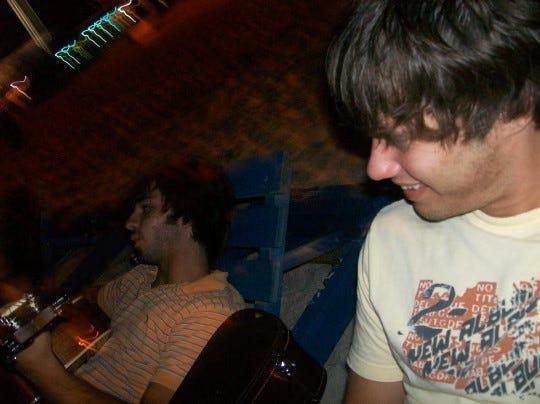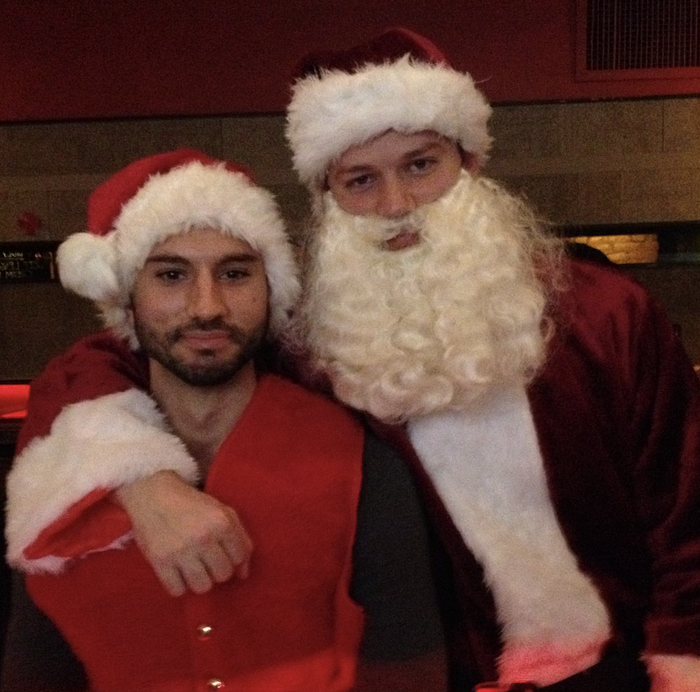Josh's my first memory is watching him punch a kid in the face at Sunday school. Losing patience after being bullied over the rights to his favorite toy, he landed a right hook worthy of a highlight reel. As his adversary wailed in pain, the teacher rushed in, ready to enforce justice.
“Josh Bates! What have you done!?”
He calmly replied, tilting his head back and raising an eyebrow to the sky, with perfect eye contact and a slightly anxious smile.
“Well... don’t ever do that again,” his disciplinary response came, but he was caught off guard by his seriousness and could only chase the consequences.
The fundamental honesty faced with danger would become a defining characteristic of his life.
That was over 30 years ago. A clear image of an island surrounded by the fog of scattered memories. The toys were gold, and the teachers were gods. My toddler friends stood as judges, jurors, and executioners, staring intently as he defended his territory, surviving a time otherwise blurred by time. Why?
The fog would clear again years later. This time, he stood outside a middle school locker as I approached.
“Hey Andrew, let’s start a band,” he suggested. “I’m going to learn to play guitar. Why don’t you try learning drums?” Annoyed that I was thinking of a fanciful posture, I found him to be uncontrollable.
“Josh,” I said as I turned to him. “I’m not going to learn to play drums. And you’re not going to learn to play guitar.” I was half right.
Within months, he could play along with most of the radio. Soon after, he formed a band with far fewer cynical drummers. Later, he was touring local venues. At his peak, he spent time on a competitive music project like a soup kitchen.
In our late teens, we found ourselves on vacation in the Florida Panhandle. On our first night as the sun set, he walked down to the shore and began to play. Within minutes, passersby stopped to listen. Then another stopped, and a few more stopped. A crowd formed, and onlookers began shouting requests. Josh walked around to each one.
As the last few notes of the previous song played, he seamlessly flowed into the next request without a glance at where it had come from. As he hit every note of the songs thrown at him in an easy succession, eyebrows were raised. Enchanted beachgoers turned the shore into a seaside concert. The volume rose until the last rays were cut off by the horizon. The inhibitions faded. Voices rang out, and the surrounding stragglers continued to be drawn into the fiery scene, rolling forward with the waves.
At the peak of the show, a pair of police officers rushed in, ready to disperse the madness, lured by the captivating chord progressions that broke the aggression. A toxic couple joined hands. An improvised tribe, eagerly integrated, covered in tattoos. The poor wretch in the back temporarily forgot he was born of the worst combination of possible genes. They suddenly remembered life. This went on for hours.
Throughout it all, he remained aware of the line of admirers forming at the front of the crowd. Cute girls forced their way past the barricades, hoping to win his favor while he stared straight at the ground in front of him, translating the notes that delighted the crowd as soon as the performance stole the intensity. I don’t know if he ever saw the size of the crowd he painted every night that week. I don’t know if he saw anything at all.

I came back to him, ready to admit my mistakes and learn.
“Hey Josh, do you think you could give me some lessons?” I finally asked after swallowing enough pride.
“Sure man,” he offered with the same smile he had shown long ago in the aftermath of the kindergarten fight. We explored the basics of the chords needed to get me off the ground.
“Yeah, that’s C,” he acknowledged as I tried to prove I had done the bare minimum of self-learning. “Can you hear the difference? Do you hear how smooth the transition is?”
He eventually decided I was ready to graduate from beginner. “Try this: C-Sharp Minor.” He barred the fourth fret, placed his fingers, and struck the necessary notes with transparent perfection. I tried to mimic him, but produced a messy clash of half-pressed strings and unintended harmonics like a ghost piano of a forgotten mansion. I grimaced at my blunder.
“Don’t worry about it, man,” he said.
As he became more knowledgeable about music, the rest of the world became less relevant. Our conversations grew shorter and more abstract. In our group of friends, he played background music from the sidelines while the rest of the room endlessly yapped about the week’s nonsensical tastes. His room began to resemble a musical sanctuary, filled with guitars suitable for every style, from Gibson to Les Paul to Taylor to Gretsch. The honorable defender of toys became a vessel of acoustic truth.
One night, I asked, “If you had to work outside of music, what would it be?” He smiled with the same independent grin that had become his trademark. “Who cares, I would never work outside of music.”
He had never worked outside of music. As my life zigzagged in geographical and metaphorical directions, he remained steadily grounded in the musicians and instruments he had drawn into his orbit. Time passed. Distance challenged the foundation of a friendship born beyond the horizon of consciousness. Memories began to fade. Some survived.
Years later, I received the long-awaited text:
“I’m coming to visit you in New York. What should we do?”
We did a lot. Days in Brooklyn, nights in Manhattan, passing moments of idolhood, exploring the spaces in between. One night, we found one of his long-standing jazz clubs and sank into its rhythm.
“Jazz doesn’t resolve,” he explained. “Most music sticks to basic patterns, but jazz—you can’t understand it. That’s why it gets stuck in your head. Your mind is always racing to find the next note, but that unpredictability sucks you in and violates your expectations. That’s why people love it.”
I ordered a beer and looked down at him.
“So are you dating anyone?” he asked, sensing my discomfort and trying to liven up the conversation.
“No, not really.”
“Do you want to know what your problem is?”
“What’s that?”
“You don’t know how to slay dragons,” he asserted with deadly seriousness. “If you want to be with a girl, you need to know how to slay her dragon.”
“Josh, what are you talking about?”
“Don’t worry about it,” he grinned again. “You’ll get it.”
As I walked down the path of memories, I often find myself struck by the breadcrumbs left behind. Decades of friendship encapsulated in a few flashes. Hints of wisdom buried in the remains. A series of clues pointing to discoveries beyond the periphery of understanding. Fragments of a life that presented itself to your heart, allowing you to hear their messages if you lived long enough to grasp them. You felt their significance, but your conscious mind wasn’t ready to decipher them, so the scenes grabbed you, finding ways to survive the onslaught of time until they were ready to be heard.
Like genes trying to replicate themselves in the next generation, memories that mean to record themselves for safekeeping wait for the right moment to resurface, perhaps to be reborn into the world, to live undisturbed, and to encode their lessons into a new host to move them forward.
JOSH's own dragon was slain on a spring morning just after the last weekend faded to black. The prolonged suffering was finally defeated by a bullet from his own hand. After that, apologies, funds for bills, love letters to his sister, a collection of songs left behind.
That morning, my phone rang off the hook. The text burned a hole in my pocket, sending chills down my spine until I finally stepped away from the meeting to face the terrible news I felt was imminent. “Josh is dead,” it rang out as soon as I answered my return call. “The funeral is next week. Come home.”
Days later, I embraced the long-continued locker-side declaration to incorporate the site of preschool rebellion and the last notes of a lifetime of performance. The preacher spoke, and the band played. Anecdotes about music and brave honesty, and long estranged friends reunited.
Shortly after the ceremony ended, we stood in the museum he called his bedroom. Among the artifacts, I found the central presence of the bygone seaside concert, carried away in hands far more skilled than I was used to, yet fully honoring its magical potential.
In the years that followed, I played it against the skylines of New York and Paris, bringing it on a journey across the continent to claim them. It mediated new relationships with familiar tunes that lowered defenses, helping to resolve romantic tensions with soothing notes that made my girlfriend forget why she was mad. At weekend parties, it bridged the gap from meaningless outbursts to intimate conversations, providing a convenient excuse for friends to extend the night. And it lay dormant, inevitably ignored for the routines of life that demanded attention, further separating it from the carefree adolescence of time.
As my final memory converges with the present, the memory trail comes to an end. I stand back, take it with me, and the lessons settle in.
last night I stumbled home. I was beaten and battered by a day filled with relentless minutes. A head filled with too many thoughts left little room for memories, eagerly doing nothing but resting. I unlocked the door, emptied my pockets, and headed for bed.
As I passed through the hallway, I caught a glimpse of his old guitar staring at me from the corner. I picked it up and struck a perfect C-Sharp Minor.

